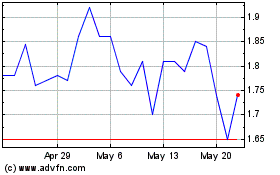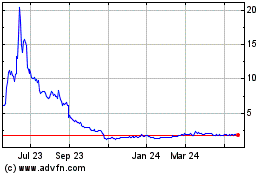Sonnet BioTherapeutics Holdings, Inc. (NASDAQ:SONN) (the "Company"
or "Sonnet"), a clinical-stage company developing targeted
immunotherapeutic drugs, announced today an expansion of its Phase
1 SB101 clinical study of SON-1010 (IL12-FHAB) in adult patients
with advanced solid tumors to add a new cohort to evaluate the
effect of SON-1010 in combination with trabectedin (Yondelis®),
following the successful completion of monotherapy dose escalation.
This expansion will explore the immune-oncology impact of SON-1010
at the maximum tolerated (MTD) dose of 1200 ng/kg in combination
with trabectedin, which is an approved chemotherapeutic drug for
certain advanced soft-tissue sarcomas (STS). Patients with STS
could potentially benefit from an enhanced local immune response in
the tumor microenvironment (TME). Enrollment in this cohort is
underway and is expected to be completed in H1 calendar year 2025.
Topline safety data of the combination with trabectedin is expected
in H2 calendar year 2025; no new safety concerns have been reported
to date. Additionally, the Company announced the release of a “What
This Means” segment to discuss the expansion of the Phase 1
clinical study which is now available here.
“The Sarcoma Oncology Center is pleased to have
been able to enroll most of the patients in Sonnet’s Phase1 SB101
study to date, with the majority of the patients having STS,”
commented Dr. Sant Chawla, Principal Investigator at the Sarcoma
Oncology Center in Santa Monica, California. “Additionally, as we
have contributed to the development of trabectedin over the years,
we were excited to see its approval in early 2024 as a monotherapy
in the second-line treatment for two of the most common types of
sarcoma — liposarcoma and leiomyosarcoma. While the trabectedin
approval was based on several clinical trials in sarcoma, we
believe a large unmet need remains for the treatment of STS. We
believe that combining trabectedin with SON-1010 has the potential
for a natural synergistic effect of the two mechanisms of
action.”
The Company expects to enroll up to 18 patients
with unresectable, metastatic liposarcoma or leiomyosarcoma in this
open-label, single-arm expansion cohort. The patients will be
treated with SON-1010 in combination with the standard 21-day
trabectedin cycles, alternating the dosing of the two drugs. This
number of subjects may be needed to see a statistical benefit in
the response using the standard RECIST paradigm. The primary
outcome measures for the Phase 1 SB101 trial are the safety,
tolerability, pharmacokinetics (PK) and pharmacodynamics (PD) of
SON-1010 and to establish the MTD, which has been set at 1200
ng/kg. The Company believes the results of this expansion cohort
could position SON-1010 for a larger Phase 2 study that could
establish the combination of SON-1010 and trabectedin as a new and
potentially improved treatment for STS.
“The ability to assess earlier-stage patients is
an exciting opportunity to evaluate the potential for SON-1010 to
turn ‘cold’ tumors ‘hot’,” said Richard Kenney, M.D., Sonnet's
Chief Medical Officer. “Most Phase 1 studies in the oncology space
are done in patients with advanced disease, whose immune systems
may not respond optimally after multiple types of chemotherapy.
Trabectedin’s approval as a single agent second-line therapy in STS
provides access to patients at an earlier stage with an underlying
immune response that may be more robust.”
“The Sonnet team has been studying the efficacy
and safety of SON-1010 as a single agent, which has thus far
suggested clinical benefit when administered as a monotherapy in
patients with advanced solid tumors,” said Pankaj Mohan, Ph.D.,
Sonnet Founder and Chief Executive Officer. “Further, we believe
this synergy could improve the response in a serious type of cancer
at an earlier stage of disease, which could open up another
potential opportunity for partnering.”
SON-1010 is the Company’s proprietary version of
recombinant human interleukin-12 (rhIL-12), configured using
genetic fusion to Sonnet's Fully Human Albumin Binding (FHAB®)
platform, which extends the half-life and bioactivity of the IL-12
component due to binding native albumin in the serum. Albumin
naturally targets the TME by strong binding to gp60 and Secreted
Protein Acidic and Rich in Cysteine (SPARC). The majority of
patients enrolled to date in the Phase 1 SB101 trial have STS,
which has a known potential for an enhanced response to
immunotherapy.
Trabectedin is an alkylating DNA-binding agent
that was approved as a second-line treatment in early 2024 for
patients with unresectable, metastatic liposarcoma or
leiomyosarcoma who have received a prior anthracycline-containing
regimen. It is also known to activate tumor macrophages into a
pro-inflammatory phenotype. The Company believes that SON-1010 has
the potential to complement that activity by activating the NK and
T cells in the TME to secrete more interferon-gamma (IFNγ) which is
considered to be important for anti-tumor control.
For more information about the Phase 1 SB101
trial in adult patients with advanced solid tumors visit
www.clinicaltrials.gov and reference identifier NCT05352750.
SON-1010 is also being evaluated in a Phase
1b/2a dose-escalation and proof-of-concept study (SB221) in
combination with SON-1010 and atezolizumab (Tecentriq®) (in
collaboration with Genentech, a member of the Roche Group), which
is focused on platinum-resistant ovarian cancer (PROC)
(NCT05756907). Enrollment remains ongoing and an update on safety
at the MTD in that trial is expected in Q1 calendar year 2025.
About SON-1010
SON-1010 is a candidate immunotherapeutic
recombinant drug that links unmodified single-chain human IL-12
with the albumin-binding domain of the single-chain antibody
fragment A10m3. This single-chain antibody fragment was selected to
bind albumin both at normal pH, as well as at the acidic pH
typically found in the TME. The FHAB technology targets tumor and
lymphatic tissue, providing a mechanism for dose sparing and an
opportunity to improve the safety and efficacy profile of not only
IL-12, but a variety of potent immunomodulators that can be linked
using the platform. Interleukin-12 can orchestrate a robust immune
response to many cancers and pathogens. Given the types of proteins
induced in the TME, such as the Secreted Protein and Rich in
Cysteine (SPARC) and glycoprotein 60 (GP60), several types of
cancer, such as non-small cell lung cancer, melanoma, head and neck
cancer, sarcoma, and some gynecological cancers are particularly
relevant to this approach. SON-1010 is designed to deliver IL-12 to
local tumor tissue, turning ‘cold' tumors ‘hot' by stimulating
IFNγ, which activates innate and adaptive immune cell responses and
increases the production of Programed Death Ligand 1 (PD-L1) on
tumor cells.
About the Phase 1 SB101 Trial
This first-in-human study is primarily designed
to evaluate the safety of multiple ascending doses of SON-1010 in
cancer patients and is being conducted at several sites across the
United States. While the optimal dose is unknown at this stage, the
potential to target the tumors, the extended PK mechanism, and our
preclinical data suggest the therapeutic dose may be lower compared
to native human IL-12. The study, utilizing a standard 3+3 oncology
design in at least five cohorts, established the MTD at 1200 ng/kg
using subcutaneous injections of SON-1010 every 3 to 4 weeks. The
primary endpoint explores the safety and tolerability of SON-1010,
with key secondary endpoints intended to measure PK, PD,
immunogenicity, and anti-tumor activity. This study will form the
basis for potential combinations with other types of
immunotherapies and the future development of bispecific candidates
using the FHAB platform.
About Sonnet BioTherapeutics Holdings, Inc.
Sonnet is an oncology-focused biotechnology
company with a proprietary platform for developing targeted
biologic drugs with single or bifunctional action. Known as FHAB
(Fully Human Albumin-Binding), the technology utilizes a fully
human single chain antibody fragment (scFv) that binds to and
"hitch-hikes" on human serum albumin (HSA) for transport to target
tissues. Sonnet's FHAB was designed to specifically target tumor
and lymphatic tissue, with an improved therapeutic window for
optimizing the safety and efficacy of immune modulating biologic
drugs. FHAB platform is the foundation of a modular, plug-and-play
construct for potentiating a range of large molecule therapeutic
classes, including cytokines, peptides, antibodies and
vaccines.
Sonnet’s lead program, SON-1010, or IL-12-FHAB,
is in development for the treatment of solid tumors and ovarian
cancer. SON-1010 is being evaluated in an ongoing Phase 1/2a study
through a Master Clinical Trial and Supply Agreement, along with
ancillary Quality and Safety Agreements, with Roche in combination
with atezolizumab (Tecentriq®) for the treatment of
platinum-resistant ovarian cancer (PROC). The Company is also
evaluating its second program, SON-1210, an IL12-FHAB-IL15 for
solid tumors, in collaboration with the Sarcoma Oncology Center to
commence an investigator-initiated and funded Phase 1/2a study for
the treatment of pancreatic cancer.
The Company’s SON-080 program is a low dose of
rhIL-6 in development for Chemotherapy-Induced Peripheral
Neuropathy (CIPN) and Diabetic Peripheral Neuropathy (DPN). SON-080
demonstrated encouraging results in a Phase 1b/2a clinical trial,
being well tolerated with no evidence of a pro-inflammatory
cytokine response. In October 2024, Sonnet announced an India
license agreement with Alkem Laboratories, Inc. who will assume
responsibility for advancing development of the SON-080 program
into a Phase 2 study in DPN.
Forward-Looking Statements
This press release contains certain
forward-looking statements within the meaning of Section 27A of the
Securities Act of 1933 and Section 21E of the Securities Exchange
Act of 1934 and Private Securities Litigation Reform Act, as
amended, including those relating to the outcome of the Company’s
clinical trials, the Company's cash runway, the Company's product
development, clinical and regulatory timelines, market opportunity,
competitive position, possible or assumed future results of
operations, business strategies, potential growth opportunities and
other statements that are predictive in nature. These
forward-looking statements are based on current expectations,
estimates, forecasts and projections about the industry and markets
in which we operate and management's current beliefs and
assumptions.
These statements may be identified by the use of
forward-looking expressions, including, but not limited to,
"expect," "anticipate," "intend," "plan," "believe," "estimate,"
"potential," "predict," "project," "should," "would" and similar
expressions and the negatives of those terms. These statements
relate to future events or our financial performance and involve
known and unknown risks, uncertainties, and other factors which may
cause actual results, performance or achievements to be materially
different from any future results, performance or achievements
expressed or implied by the forward-looking statements. Such
factors include those set forth in the Company's filings with the
Securities and Exchange Commission. Prospective investors are
cautioned not to place undue reliance on such forward-looking
statements, which speak only as of the date of this press release.
The Company undertakes no obligation to publicly update any
forward-looking statement, whether as a result of new information,
future events, or otherwise.
Investor Relations Contact:JTC
Team, LLCJenene Thomas908-824-0775SONN@jtcir.com
Sonnet BioTherapeutics (NASDAQ:SONN)
Historical Stock Chart
From Dec 2024 to Jan 2025

Sonnet BioTherapeutics (NASDAQ:SONN)
Historical Stock Chart
From Jan 2024 to Jan 2025
